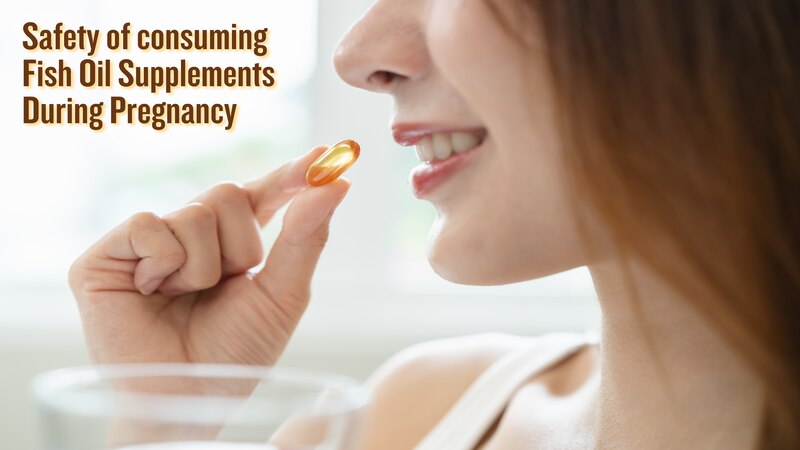
Omega-3 fatty acids are essential for producing prostaglandins, which regulate physiological processes like blood pressure, coagulation, nerve signaling, and more. Pregnant women are at higher risk of omega-3 deficiency as their reserves support fetal development. Research suggests that fish oil supplements during pregnancy may reduce the risk of preterm birth and preeclampsia, enhance birth weight and fetal brain development, and lower the chances of cerebral palsy and postpartum depression.
Omega-3 fatty acids are vitally important for the unborn baby’s brain development and eye development. So it is advised that a mother’s diet should contain the requisite quantity of omega-3 fatty acids. If you do not have fish regularly, consuming fish oil during pregnancy is the closest option. But is it safe? Frankly, yes and no. Let’s find out.
Is It Safe To Eat Fish Oil Supplements During Pregnancy?
Safety depends upon the type of fish oil. If fish oil is taken from the body of the fish, it is safe. But the oil taken from the liver of fish—cod liver oil—is not safe to consume during pregnancy. The reason is that cod liver oil contains vitamin A in high levels, which is not safe to consume during pregnancy. Intake of a higher amount of vitamin A places a baby at risk of birth defects such as malformation of the heart, spinal cord, face, brain, etc. (Retinoid embryopathy).
Why Should Pregnant Women Take Fish Oil Supplements?
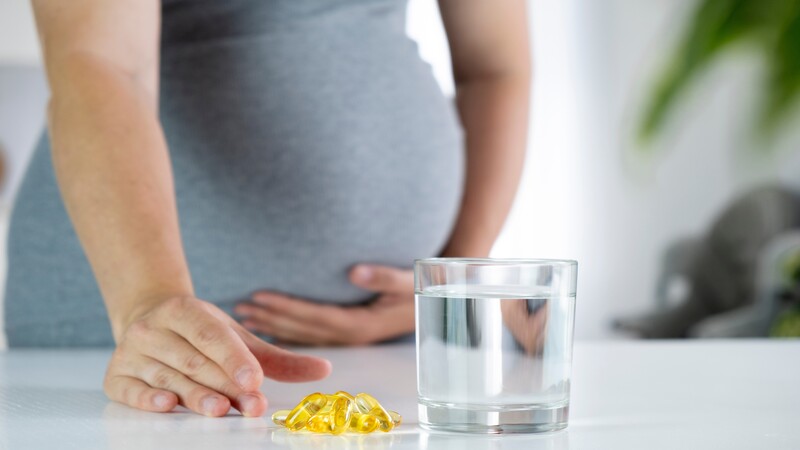
Fish oil supplements are known as beneficial dietary additions for expectant mothers due to omega-3 fatty acids that ensure a healthy pregnancy.
The potential advantages of incorporating fish oil supplements during pregnancy include:
1. Enhanced Fetal Brain Development
Research indicates that fish oil supplements can positively influence the neurodevelopmental progress of children. (1). Omega-3 fatty acids, particularly DHA found in fish oil, significantly influence fetal brain development. Consuming fish oil during pregnancy may help support cognitive function and neural growth in the developing fetus.
2. Decreased Likelihood Of Preterm Birth
An increased intake of EPA and DHA may contribute to a lower risk of preterm labor and delivery. Consuming fish oil during pregnancy may reduce the likelihood of preterm birth, potentially due to its anti-inflammatory properties and support for fetal development.
3. Lowered Risk Of Postpartum Depression
A deficiency in omega-3 fatty acids may elevate the mother’s susceptibility to depression, potentially elucidating why postpartum mood disorders can worsen and manifest earlier in subsequent pregnancies (2).
4, Diminished Risk Of Allergies In Infants
Consuming fish oil during pregnancy may decrease the risk of allergies in infants, as omega-3 fatty acids can promote immune system development. Research suggests that maternal intake of fish oil may help reduce the incidence of allergic conditions, such as eczema and asthma, in children. (3)
What Is Omega-3 Fatty Acid?
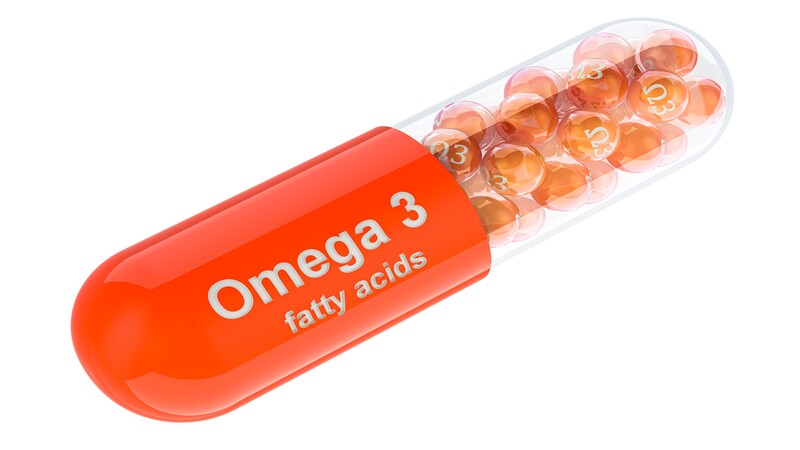
Omega 3 fatty acids are polyunsaturated fatty acids (4). They are essential fatty acids required for many functions of the human body (5). There are three types of omega-3 fatty acids.
- Alpha-linolenic acid (ALA), which is found in plant sources such as seeds, nuts, etc. (6)
- Eicosapentaenoic acid (EPA) found in fish (7)
- Docosahexaenoic acid (DHA) found in fish (8)
Our body cannot synthesize this fatty acid, so we rely on food with sufficient omega-3 fatty acids. Fish is a good source of omega-3 fatty acids. Fatty fish such as mullet, tuna, salmon, sardines, and mackerel are excellent sources of omega-3 fatty acids.
Can I Eat Fish During Pregnancy, Are There Any Risk Factors?

Yes, you can eat fish during pregnancy. However, there are some points to consider. Eating fish during pregnancy has some risks, which are as follows:
1. Choose Fish that has Less Mercury Contamination
Some kind of fish is found to be contaminated with mercury. Your body will absorb mercury easily from the fish in your diet and it can reach your child through the placenta. This metal damages the development of the brain and the whole nervous system of your child (9).
2. Purchase from Verified Sources
Polychlorinated biphenyls (PCB) are found in fish from the contaminated lake. Like mercury, it can also pass to the fetus through the placenta (10). Severe neurological and motor control problems are observed in children whose mothers are exposed to PCB during pregnancy.
3. Cook it Properly
Consuming fresh fish and seafood in raw or undercooked state may present a risk of exposure to Norovirus, Hepatitis A Virus, Listeria monocytogenes, Campylobacter, Salmonella, and Escherichia coli. Smoked fish carries a particular risk for Listeria monocytogenes (11).
You can read more on fish during pregnancy here
What Are The Advantages Of Consuming Fish Oil Over Fish During Pregnancy?
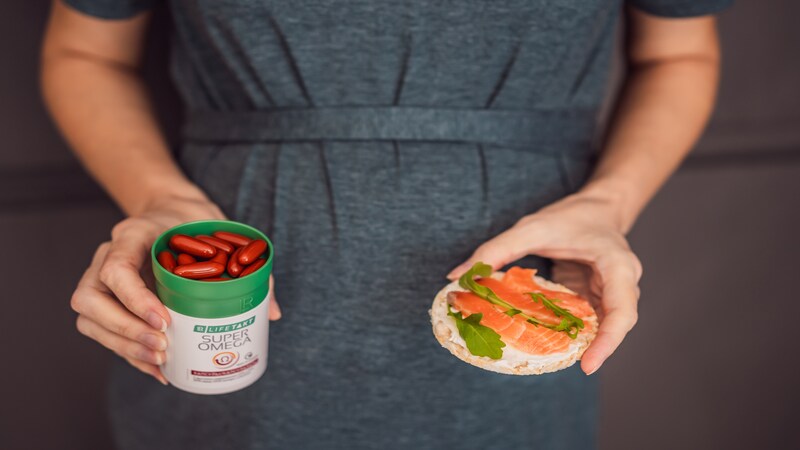
Fish oil supplements are generally safe during pregnancy when recommended, but it is important to consult a healthcare professional first. There are certain advantages of using Fish Oil over Fish during Pregnancy.
- High-quality fish oil is safe, while fresh fish may contain harmful contaminants like mercury.
- Harmful compounds like PCB are also not found in fish oil.
Can I Depend On Other Food Sources For Omega-3 Fatty Acids?
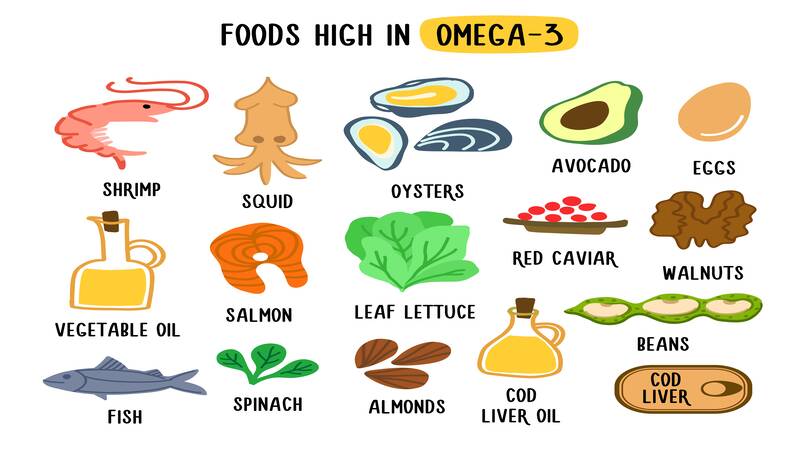
Omega-3 fatty acids play a crucial role in maintaining health. Sources like walnuts, flaxseeds, and rapeseed oil are rich in alpha-linolenic acid (ALA). These foods are advantageous for overall health, particularly for the cardiovascular system. Therefore, it is advisable to incorporate omega-3-rich foods regularly.
Following are some top omega-3 foods that can be included in the pregnancy diet:
1. Flaxseeds and Flax Oil
Ground flaxseeds are a great plant-based source of omega-3 fatty acids (12). Sprinkle them on yogurt, smoothies, or oatmeal for a nutty flavor and make it more nutritious. Flax oil can also be used in salad dressings or as a substitute for other oils in cooking.
2. Chia Seeds
Chia seeds are rich in omega-3 fatty acids and fiber (13). One can add them to your breakfast cereal, blend them into smoothies, or make chia seed pudding for a nutritious snack.
3. Walnuts
Walnuts are another good choice for omega-3 fatty acids (14). You can snack on a handful of walnuts or add them to salads, oatmeal, or baked goods.
4. Soybean
Soybean is a versatile legume that contains omega-3 fatty acids (15). Incorporate them into various dishes like stir-fries, curries, and salads. Include soybean products like tofu or soy milk in your meals to increase your omega-3 intake.
5. Mustard Oil
Mustard oil is a staple cooking oil. It is a unique source of Omega-3 fatty acids (16). Consider using it in cooking or as a salad dressing.
6. Olive Oil
Extra virgin olive oil is a healthy cooking option rich in omega-3 fatty acids (17). Use it for sautéing vegetables or as a dressing for salads.
What Are The Advantages Of Fish Oil Over The Flaxseeds?
Even though both are good sources of omega-3 fatty acids, only fish oil contains EPA and DHA, which are vital omega-3 three fatty acids (18). So intake of fish oil guarantees daily EPA and DHA. The fatty acid in flax seeds is ALA, which can be used in producing EPA and DHA (19) but in comparatively small quantities. So large amounts of flax seeds should be consumed to gain the same effect as consuming a small fish oil dosage.
Benefits Of Consuming Fish Oil During Pregnancy?

Consuming fish oil during pregnancy offers numerous benefits, primarily due to its high content of omega-3 fatty acids, particularly DHA and EPA Following are some top benefits of consuming fish oil during pregnancy:
- Omega 3 fatty acids produce Resolvin, which reduces the inflammatory conditions of the placenta, thus improving the functioning of the placenta (20)
- Improves brain and nervous development of the fetus (21)
- Reduces the chances of developing eczema in babies after birth by around 36% (22)
- When mothers take fish oil during pregnancy, their children tend to develop excellent hand-eye coordination
- Improves eyesight as omega-3 fatty acids have a significant role in the formation of the retina of the fetus
- Reduces the risk of cerebral palsy
- Helps to avoid preterm delivery as DHA and EPA in fish oil help to prevent the production of prostaglandins (helps in contracting uterine wall), thus preventing preterm delivery and low birth weight
- Helps in regulating pregnancy-induced hypertension (23)
- It is believed that omega-3 fatty acids have a role in preventing perinatal depression (24) or postpartum depression (25)
- It reduces the chances of pre-eclampsia, a condition that reduces the flow of blood through the placenta, resulting in the restricted growth of the fetus
What Is The Safe Dosage Of Fish Oil During Pregnancy?
A daily dose of fish oil supplement should not contain more than three grams of EPA + DHA. This is a safe dosage for pregnant women. Three grams of fish oil per day won’t do any harm, but we suggest you consult your doctor first.
Precautions for Taking Fish Oil During Pregnancy
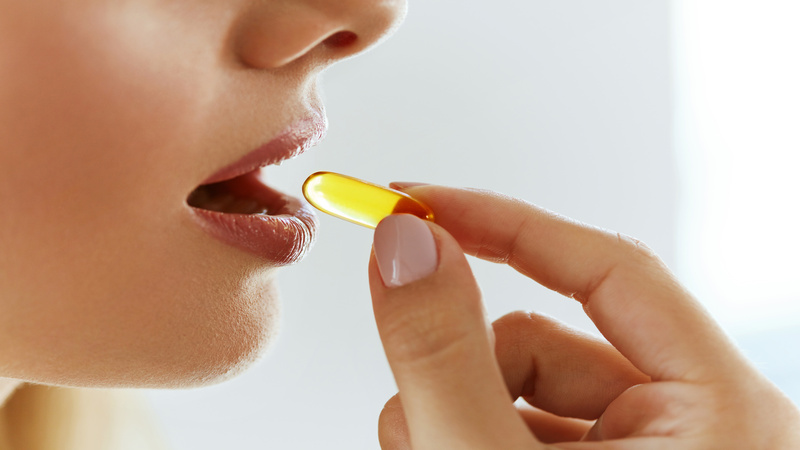
While fish oil can provide significant benefits during pregnancy, it’s essential to take certain precautions.
- You should make sure that your supplement has NPN on the wrap or bottle. Having a Natural Product Number means the product is tested for heavy metals, toxins, and pesticides
- Don’t take fish oil if you are not sure of its purity. Rely on reputed brands of fish oil capsules when you are pregnant. Otherwise, the oil inside the capsule may be rancid. Consuming fish oils that are not properly distilled and filtered is dangerous, especially when you are pregnant. Take your doctor’s advice
- Never take fish oil prepared in unhygienic conditions
- If you are allergic to fish, don’t take fish oil supplements during pregnancy
- Ask your doctor before taking the fish oil. The dosage should be as prescribed by your doctor
- Expectant mothers who do not consume fish can acquire omega-3 fatty acids using fish oil supplements derived from algal oil. Algal oil extracted from marine algae provides DHA too.
Expectant mothers should include omega-3 fatty acids, particularly DHA, in their diets for fetal neurological development. Postnatally, fish oil can improve brain development, visual acuity, and motor skills in breastfed infants. Expectants must get their fish oils from natural sources free of heavy metals (mercury, BPA) and avoid consuming fish high in the food chain. Be sure to purchase supplements from a reputable source with natural ingredients.
FAQ’s
1. Is Fish Oil Good for Baby In The Womb?
Yes. It is safe to take fish oil. Fish oil is rich in Omega-3 Fatty acids, which increase the flow of fetal blood perfusion and improve brain development
2. When Should I Stop Taking Fish Oil During Pregnancy?
Fish oil does not affect pregnancy. Medical professionals advise beginning supplementation only from the first trimester. If the pregnant individual has any allergy, particularly to food, it is essential to discontinue use immediately.
3. Which Fish Oil Is Best For Pregnancy?
Expectant mothers should ensure their fish oil comes from a natural source free of heavy metals like mercury and BPA. To reduce heavy metal toxicity, avoid oils from sharks and swordfish and choose supplements from reputable suppliers that use natural ingredients.
4. Does Fish Oil Help Prevent Miscarriage?
Fish Oil, if taken in the optimum dose, reduces the risk of preterm labor, miscarriage, and stillbirth. It improves uterine arterial blood flow and reduces the inflammation of the placental lining.
References
- Sherzai D, Moness R, Sherzai S, Sherzai A. A Systematic Review of Omega-3 Fatty Acid Consumption and Cognitive Outcomes in Neurodevelopment. Am J Lifestyle Med. 2022 Nov 16;17(5):649-685. – https://www.ncbi.nlm.nih.gov/pmc/articles/PMC10498982/
- Sherzai D, Moness R, Sherzai S, Sherzai A. A Systematic Review of Omega-3 Fatty Acid Consumption and Cognitive Outcomes in Neurodevelopment. Am J Lifestyle Med. 2022 Nov 16;17(5):649-685. – https://www.ncbi.nlm.nih.gov/pmc/articles/PMC5481805/
- Ciaccio CE, Girdhar M. Effect of maternal ω3 fatty acid supplementation on infant allergy. Ann Allergy Asthma Immunol. 2014 Mar;112(3):191-4. – https://pmc.ncbi.nlm.nih.gov/articles/PMC3961846/
- Mark A. Hull, Omega-3 polyunsaturated fatty acids, Best Practice & Research Clinical Gastroenterology, Volume 25, Issues 4–5, 2011, Pages 547-554, ISSN 1521-6918 – https://www.sciencedirect.com/science/article/abs/pii/S1521691811000758
- Covington MB. Omega-3 fatty acids. Am Fam Physician. 2004 Jul 1;70(1):133-40.- https://pubmed.ncbi.nlm.nih.gov/15259529/
- Ella J. Baker, Elizabeth A. Miles, Graham C. Burdge, Parveen Yaqoob, Philip C. Calder, Metabolism and functional effects of plant-derived omega-3 fatty acids in humans, Progress in Lipid Research, Volume 64, 2016, Pages 30-56 – https://www.sciencedirect.com/science/article/abs/pii/S0163782716300303
- Pratima Bajpai, Pramod K. Bajpai, Eicosapentaenoic acid (EPA) production from microorganisms: a review,
Journal of Biotechnology, Volume 30, Issue 2, 1993, Pages 161-183 – https://www.sciencedirect.com/science/article/abs/pii/016816569390111Y - Kuratko CN, Barrett EC, Nelson EB, Salem N Jr. The Relationship of Docosahexaenoic Acid (DHA) with Learning and Behavior in Healthy Children: A Review. Nutrients. 2013; 5(7):2777-2810. – https://www.mdpi.com/2072-6643/5/7/2777
- Oken E, Radesky JS, Wright RO, Bellinger DC, Amarasiriwardena CJ, Kleinman KP, Hu H, Gillman MW. Maternal fish intake during pregnancy, blood mercury levels, and child cognition at age 3 years in a US cohort. Am J Epidemiol. 2008 May 15;167(10):1171-81. – https://www.ncbi.nlm.nih.gov/pmc/articles/PMC2590872/
- Kezios, K.L., Liu, X., Cirillio, P.M. et al. Prenatal polychlorinated biphenyl exposure is associated with decreased gestational length but not birth weight: archived samples from the Child Health and Development Studies pregnancy cohort. Environ Health 11, 49 (2012) – https://ehjournal.biomedcentral.com/articles/10.1186/1476-069X-11-49
- Moran LJ, Verwiel Y, Bahri Khomami M, Roseboom TJ, Painter RC. Nutrition and listeriosis during pregnancy: a systematic review. – https://www.ncbi.nlm.nih.gov/pmc/articles/PMC6161013/
- Parikh M, Maddaford TG, Austria JA, Aliani M, Netticadan T, Pierce GN. Dietary Flaxseed as a Strategy for Improving Human Health. Nutrients. 2019 May 25;11(5):1171 – https://www.ncbi.nlm.nih.gov/pmc/articles/PMC6567199/
- Ullah R, Nadeem M, Khalique A, Imran M, Mehmood S, Javid A, Hussain J. Nutritional and therapeutic perspectives of Chia (Salvia hispanica L.): a review – https://www.ncbi.nlm.nih.gov/pmc/articles/PMC4926888/
- Petrović-Oggiano G, Debeljak-Martačić J, Ranković S, Pokimica B, Mirić A, Glibetić M, Popović T. The Effect of Walnut Consumption on n-3 Fatty Acid Profile of Healthy People Living in a Non-Mediterranean West Balkan Country, a Small Scale Randomized Study. Nutrients – https://www.ncbi.nlm.nih.gov/pmc/articles/PMC7019815/
- Krishnanand P. Kulkarni, Rupesh Tayade, Hyun Jo, Jong Tae Song and Jeong-Dong Lee
Submitted: 19 August 2020 Reviewed: 19 November 2020 Published: 19 January 2021 – https://www.intechopen.com/chapters/74727 - Das G, Tantengco OAG, Tundis R, Robles JAH, Loizzo MR, Shin HS, Patra JK. Glucosinolates and Omega-3 Fatty Acids from Mustard Seeds: Phytochemistry and Pharmacology. Plants (Basel). 2022 Sep 1;11(17):2290.- https://www.ncbi.nlm.nih.gov/pmc/articles/PMC9459965/
- Waterman E, Lockwood B. Active components and clinical applications of olive oil. Altern Med Rev. 2007 Dec;12(4):331-42 – https://pubmed.ncbi.nlm.nih.gov/18069902/
- Swanson D, Block R, Mousa SA. Omega-3 fatty acids EPA and DHA: health benefits throughout life. Adv Nutr. 2012 Jan;3(1):1-7 – https://www.ncbi.nlm.nih.gov/pmc/articles/PMC3262608/
- Rodriguez-Leyva D, Dupasquier CM, McCullough R, Pierce GN. The cardiovascular effects of flaxseed and its omega-3 fatty acid, alpha-linolenic acid. Can J Cardiol. 2010 Nov;26(9): 489-96 – https://www.ncbi.nlm.nih.gov/pmc/articles/PMC2989356/
- Sabah Farhat, Muhammad Usman Zafar, Maheen A. Sheikh, Chaudhry Muhammad Qasim, Faiza Urooj, Syeda Sadia Fatima, Association of resolvin level in pregnant women with preeclampsia and metabolic syndrome, Taiwanese Journal of Obstetrics and Gynecology, Volume 59, Issue 1, 2020, Pages 105-108 – https://www.sciencedirect.com/science/article/pii/S1028455919302839
- Vollet K, Ghassabian A, Sundaram R, Chahal N, Yeung EH. Prenatal fish oil supplementation and early childhood development in the Upstate KIDS Study. J Dev Orig Health Dis. 2017 Aug;8(4):465-473. – https://www.ncbi.nlm.nih.gov/pmc/articles/PMC5588657/
- Yin Jia, Yafang Huang, Huili Wang, Haili Jiang; Effect of Prenatal Omega-3 Polyunsaturated Fatty Acid Supplementation on Childhood Eczema: A Systematic Review and Meta-Analysis – https://karger.com/iaa/article/184/1/21/841798/
- Gholami N, Abotorabi S, Lalooha F, Oveisi S. Effects of Fish Oil Supplementation on Pregnancy Outcomes in Pregnant Women Referred to Kosar Hospital. Iran J Pharm Res. 2020;19(3):e124633 – https://brieflands.com/articles/ijpr-124633
- M.P. Freeman, Omega-3 fatty acids and perinatal depression: A review of the literature and recommendations for future research, Prostaglandins, Leukotrienes and Essential Fatty Acids, Volume 75, Issues 4–5, 2006, Pages 291-297 – https://www.sciencedirect.com/science/article/abs/pii/S0952327806001219
- Hamazaki K, Matsumura K, Tsuchida A, et al. Dietary intake of fish and n-3 polyunsaturated fatty acids and risk of postpartum depression: a nationwide longitudinal study – the Japan Environment and Children’s Study (JECS). Psychological Medicine. 2020;50(14):2416-2424 – https://www.cambridge.org/core/journals/psychological-medicine/article/dietary-intake-of-fish-and-n3-polyunsaturated-fatty-acids-and-risk-of-postpartum-depression-a-nationwide-longitudinal-study-the-japan-environment-and-childrens-study-jecs/94FB5C892D9B50E9D95FEF37388A0479
